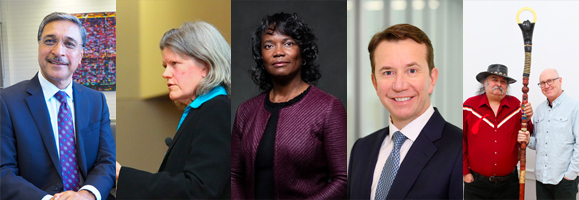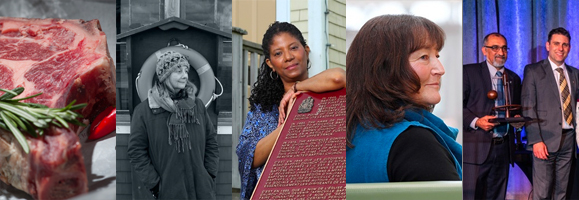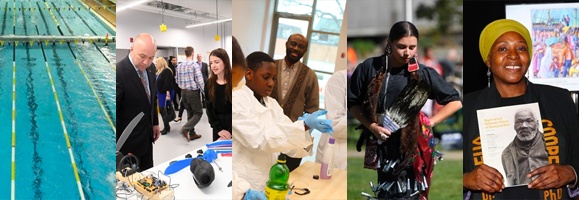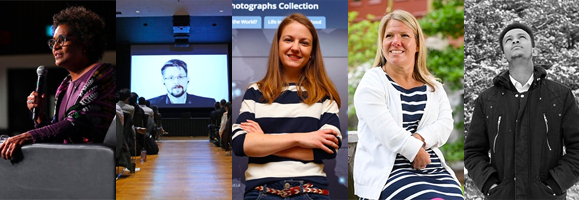In some ways, 2019 was a year of change and new beginnings for »ĆÉ«Ö±˛Ą.
It was a year in which the Dal president’s chair was held by two interim leaders, with the university’s incoming 12th president announced mid-year. A year in which the Dal community came together and started work on its next strategic plan. A year in which Dal welcomed a new board chair and announced its next chancellor.
But focus on those changes alone and you might miss the sheer volume of achievements, accolades and accomplishments that happened in every corner of the university in 2019. There were major research studies, national and international honours, stellar students and crucial milestones in the university’s continuing 200+ year story.
All year long, we kept tabs on that continuing story here on Dal News, publishing more than 500 news articles about campus news, events and happening. Here’s a look back at some of the highlights.
New faces, new directions

With President Richard Florizone departing at the end of December 2018, and a search committee launched for his successor, Dal’s administration was led for the first part of the year by former University of Saskatchewan President Peter MacKinnon, and then by Provost Teri Balser. After a global search, the Board of Governors announced in May that Deep Saini, currently president of the University of Canberra in Australia, would take over as the university’s new president in the new year. (He’s set to arrive on January 15.)
But Dr. Saini’s appointment wasn’t the only major leadership news at Dal. Candace Thomas, a partner in the law firm Stewart McKelvey, took over as Board chair in July — the first woman, and first person of colour, to chair Dal’s administrative governing body. Then in December, with Chancellor Anne McLellan’s term coming to an end, the Board announced that former cabinet minister and member of parliament, the Honourable Scott Brison, will take over as chancellor beginning in May 2019.
There were many other news items in 2019 that were decidedly “new.” There was a new strategic plan getting underway, with individuals and groups across the university contributing in a broad, team-based process. New changes and improvements in Student Health & Wellness. A new home for Convocation ceremonies in Halifax. Newly-explicated principles on Dal’s Environment, Social and Government (ESG) investment practices. And one big “new” had the word right there in its name: the reveal of the New Dawn Staff of Place and Belonging, Dal’s new ceremonial object for Convocation ceremonies.
Bold research, outstanding honours

From food to film, »ĆÉ«Ö±˛Ą researchers earned national and international headlines throughout 2019.
We got to hear why our groceries will cost more in 2020, and watch an international scholarly debate take off over the health risks (or lack thereof?) of red meat. Dal researchers made bold strides in understanding the science of aging and Alzheimer’s, with major research studies on slowing cognitive decline and frailty as risk factor for dementia. We learned about right whales and sea-level rise, the power of play and moon metals. And, with a little help from a Canadian movie star and filmmaker, Dal research on environmental racism made it to the Toronto International Film Festival and beyond.
Little wonder, then, that Dal’s research community was showered with honours this past year. Shirley Tillotson’s book on tax history garnered Canada’s top history prize. Celebrated researchers Jeff Dahn (battery science) and Ford Doolittle (genomics) earned major medals from the Royal Society of Canada (RSC), while Elaine Craig (Law), Shauntay Grant (English) and Matthew Herder (Law/Medicine) were welcomed into RSC’s College of New Scholars, Artists and Scientists. Earth Sciences’ Anne-Marie Ryan was named a 3M Teaching Fellow while children’s pain researcher Christine Chambers was selected to lead a new CIHR institute. Social Work prof Jeff Karbanow received a Senate of Canada 150th medal, Medicine’s Noni MacDonald was named to the Order of Nova Scotia and »ĆÉ«Ö±˛Ą researchers swept literally every competitive category at the 2019 Discovery Awards.
Our community, our legacy

Dal’s community connections, front-and-centre during the university’s 200th anniversary celebrations in 2018, were every bit as prominent this past year. »ĆÉ«Ö±˛Ą marked 40 years of Dalplex as a community recreation destination, and 20 years of Let’s Talk Science’s continuing educational outreach. The launch of the Emera ideaHUB on Sexton Campus represented an exciting new era in fostering innovation and entrepreneurship in Atlantic Canada. We learned about alumni legacies in our own backyard — like in Masstown, in Sackville, and in your plane of vision. The Dal community worked to open its doors in new ways, too — a new space for the Imhotep’s Legacy Academy outreach program, new collaborations to expose African Nova Scotian youth to architecture, and a first-ever “sensory free” performance from the Fountain School of Performing Arts.
That focus on diversity and inclusion was a thread woven throughout the year at »ĆÉ«Ö±˛Ą. We celebrated African Heritage Month, Pride Week and Mi’kmaq History Month, the latter with Dal’s 10th-annual Mawio’mi. The university welcomed Theresa Rajack-Talley as its first vice-provost of equity and inclusion. Conversations about curriculum diversity were common, culminating in a Senate-hosted forum about how to better embed equity, diversity and inclusion in learning and teaching at »ĆÉ«Ö±˛Ą. Two Sexton Campus streets were named in honour of diversity trailblazers. And, in early September, »ĆÉ«Ö±˛Ą received the long-underway scholarly panel report on the entanglements between Lord »ĆÉ«Ö±˛Ą, the university’s namesake, and race and slavery, with the university apologizing and pledging to work on continuing its work to address this legacy.
People-powered

»ĆÉ«Ö±˛Ą welcomed some truly fascinating people to the university this year: the likes of Stephen Lewis, our Aurum alumni award winners, MichaĂ«lle Jean and even Edward Snowden (albeit by video link).
But perhaps the most fascinating people we saw on campus this year were our own. We met students who talked with trees, who created powerchair leagues, who brought an astronaut’s perspective to life, who made their mark as outstanding student-athletes. Even if you were just to read about Dal’s five Board of Governors student award winners, you’d get five different, compelling windows into life on campus. We had faculty who refereed at the World Cup, we had staff members whose personal journeys inspired their students’ generosity, and a community pulling together in the wake of hurricane impacts at home and abroad. Little wonder, then, that some of the most compelling Dal stories of the year came straight from the words of our people: the first-person stories of the ongoing We Are Dal series.
Thanks to all for an outstanding 2019, and here’s to even greater things ahead in 2020.
Top 10 most-read Dal News stories of 2019
The following are the 10 Dal News articles from 2019 that received the most page views (as of December 18, 2019).

- Introducing Deep Saini, »ĆÉ«Ö±˛Ą's 12th president (May 16)
- Behind the beef: Dal‑led research on red and processed meats challenges orthodoxy, stirs controversy (Oct. 2)
- Why the carbon tax will cost some Maritimes families more than others (Feb. 22)
- Dal Board approves tuition and fees for 2019‑20, along with changes to international tuition (April 16)
- Former federal cabinet minister and Dal Commerce alum Scott Brison appointed as university chancellor (Dec. 3)
- Reducing brain inflammation may be the key to slowing or even reversing cognitive decline associated with aging (Dec. 5)
- Frailty a key risk factor for dementia (Jan. 18)
- Schulich Leaders set to soar (Sept. 4)
- Building community, leading change: Meet this year's recipients of Dal's top student life achievement award (Mar. 22)
- Shifts in sugar consumption in Canada uncovered (Jan. 29)

